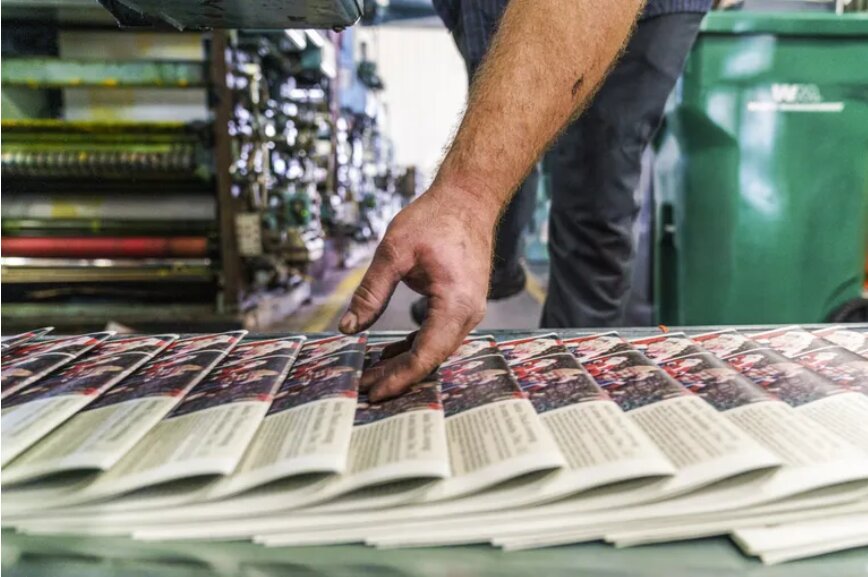
Local efforts to save journalism are sprouting in several cities and states, which is encouraging.
This shows that Americans understand the importance of local news to their communities and the country, and that they are tired of waiting for Congress to act on national proposals to help.
But I don’t believe Seattle should proceed with a proposal that’s gestating to create news vouchers, modeled on the city’s $30 million democracy voucher program.

Proponents include organizer Katie Wilson of the Transit Riders Union political group and South Seattle Emerald founder and Seattle Times contributor Marcus Harrison Green.
Wilson told me they have discussed citywide, countywide and potentially statewide voucher programs, but the most likely option is a Seattle-only program because of the city’s voters and voucher familiarity.
“Seattle voters tend to be more willing to, you know, go out and live and try something new, be the guinea pigs,” she told me a few months ago.
Details aren’t firm but news vouchers could be funded with a property tax collecting $3 million to $10 million a year. That’s up to $100 million if it runs 10 years.
If donors are found to fund a campaign, the program could be on 2024 ballots, potentially alongside a renewal of the democracy voucher program that expires in 2025.
While their concern for local news is sincere and efforts to find solutions are much appreciated, I believe the voucher program is the wrong approach for several reasons I’ll list below, where I also suggest other options.
But first some context.
East Coast political organizations pushed Seattle to pilot democracy vouchers a decade ago and now they’re enthusiastic to see news vouchers floated here as well.
The idea gained momentum after a treatise on news vouchers was published in 2021 by the Democracy Policy Network, a left-leaning Washington, D.C., think tank.
By chance I had lunch with its author, Mark Histed, recently and shared my concerns. He’s thoughtful and receptive to suggestions but what struck me, discussing this with him and other progressive policy types in New York, is how enthusiastic and positive they are about Seattle’s democracy vouchers.
In contrast, Seattleites paying for the experiment are mostly indifferent or worse, to the point it’s an expensive and problematic failure in my book.
Seattle also lost the chance to pioneer news vouchers. A D.C. council member, Janeese Lewis George, in October proposed using 0.1% of the district’s budget to create an $11.5 million per year voucher program.
If approved, it would give residents five coupons to give to registered, local news outlets. Outlets receiving at least 250 coupons would get a grant from the program, as long as they make their news free and disclose ownership and editorial protocols.
It sounds like one of those complicated retail loyalty programs. It might help a few diligent users but would flummox others and probably be mostly ignored.
That’s part of my problem with news vouchers. The proposals sound great on the surface and say the right things about saving local news. But their appeal evaporates when you see the details, complexity and ideological tilt of what’s actually proposed.
Details of what might happen in Seattle are uncertain, but it appears to have a similar bias against commercial news. That’s despite the vast majority of essential local news reporting being done by for-profit news organizations that are struggling to survive.
Wilson told me earlier that a Seattle program would likely have similar requirements that news outlets provide news for free if it’s supported by vouchers.
It would also cap how much any one outlet could receive, effectively limiting them to adding perhaps three to five full-time journalists with voucher funding.
The Seattle vouchers could only be used to make donations, and couldn’t be used to pay for a news subscription, Wilson said.
I appreciate the effort put into this but I wish Wilson would apply her formidable political skills to advance universal solutions, like the Journalism Competition and Preservation Act in Congress. It would help save local news everywhere, including news deserts that are outside metro areas like Seattle and D.C.
If organizers want to take on outsized corporate power as they work to save local news and democracy, JCPA is also the best vehicle, as it would enable thousands of small, local outlets to get fairly paid by a few tech giants.
Here are other reasons to pass on news vouchers:
● Voters may feel duped. News vouchers sound like a coupon to pay for a news subscription, the most familiar way to support local news. But the proposals won’t cover subscriptions and have complex rules.
● Voucher programs are biased toward a particular type of outlet, and may hurt ones providing most local news. Local newspapers provide more essential local news coverage than all other types of outlet combined, researchers at Duke University found in 2019. More than 90% of newspapers are for-profit and nearly all depend on subscriptions to fund their journalism. Yet voucher proposals would require participating outlets to make supported journalism free. As a result, vouchers would subsidize the relatively few that don’t sell subscriptions, and disadvantage the majority that do.
● To save local journalism, people must believe that news is worth paying for. The news industry won’t survive if it fails to reverse dot-com-era perceptions that news is free. The music industry had to do the same thing. This is stymied if outlets are required to make news free, and by policies favoring those with a free model. In this case, the preferred model is one perpetually dependent on government and donations.
● Seattle and D.C. are not news deserts. Two newspapers each day are failing, mostly in rural and suburban areas. The journalism crisis can’t wait for a few coastal cities to experiment.
● Seattle has property-tax fatigue. At some point voters will say enough, and figure out that tax levies worsen affordability and hit especially hard on disadvantaged residents. While Seattle is extraordinarily supportive of journalism, a property tax and program modeled on the “meh” democracy vouchers could erode that goodwill. In contrast, proposals for federal support are temporary, universal, straightforward and a minuscule portion of the federal budget.
● This should be national. The federal government has long subsidized news and should find a way to do so again. A good start was the $250 tax credit for news subscriptions included in the Local Journalism Sustainability Act, first proposed in 2020. A revised version now under consideration dropped those credits.
● Try something new. How about a news subscription credit funded through the stack of telecommunication fees, like a 21st century version of the postal subsidy for news? Some of these fees are intended to broaden access to information so it makes sense to ensure the survival of trusted news and information sources distributed through those networks.
● Democracy vouchers are a boondoggle. The experiment failed to prove that giving people tax dollars to donate will lead to a groundswell of civic engagement and counter big spenders’ influence.
According to Seattle’s 2021 voucher report, 91% of residents didn’t use this “free money.” That’s despite candidates hounding residents to use their vouchers.
Gains in voucher usage, including among underrepresented communities, are likely because the city hired a platoon of nonprofits to encourage those communities to use vouchers. It spent $303,000 on this outreach in 2021, but still most residents chucked vouchers like junk mail.
That year candidates received $3.4 million from vouchers. It took $1.3 million to administer them and drum up interest.
The outreach raises red flags because some of the nonprofits may have political agendas. It’s also drifting toward the city paying people to engage in elections, and selecting which voters to nudge.
Then there are outcomes like the candidate who received more vouchers than votes and races where most vouchers go to candidates that don’t make it through primaries.
If the pitch was “help some politicians raise money and maybe spark engagement among a fraction of residents,” it wouldn’t be worth $30 million.
The promise was that ordinary voters could participate and offset big spenders’ influence. That hasn’t happened, and it may have done the opposite, by encouraging more independent spending by labor and business groups unfettered by the program’s spending limits.
Sorry to digress. I’m grateful for efforts to save local news but there are more effective, universal and less controversial ways than city news vouchers.
Brier Dudley on Twitter: @BrierDudley is editor of The Seattle Times Save the Free Press Initiative. Its weekly newsletter: https://st.news/FreePressNewsletter. Reach him at bdudley@seattletimes.com.
Comments
No comments on this item Please log in to comment by clicking here